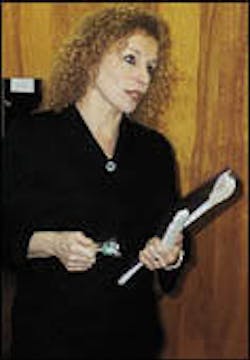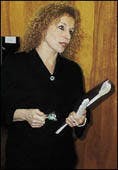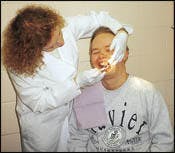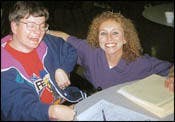Standing Tall For A Humbling Challenge
Ohio hygienist switches to a career setting where the pressure is on to provide care for adult clients with mental retardation and developmental disabilities.
by Cathy Hester Seckman, RDH
Diane Vasiliadis, a hygienist in southern Ohio, is a single mother of three teen-age boys. Two years ago, having just passed her 42nd birthday, she worked full-time with full benefits at a job she loved. Even though she was happy at work, she still skimmed the want ads.
One day, a cryptic ad intrigued her. She answered it, and within weeks, she left her perfect job for one outside clinical hygiene that paid nearly $10,000 less in salary and benefits.
Her explanation? "I wanted more of a challenge. I love hygiene, and I was a good hygienist, but something was missing. I was helping my patients, teaching them, motivating them, but it seemed too easy. Those people didn't need me as much as someone else might. I thought the new job would give me a spark I was looking for at that point in my life. I wasn't burned out, but I was capable of doing so much more. I needed a change in lifestyle."
A change is exactly what she got! Diane's titles are program coordinator, service coordinator, and program dental hygienist for Butler County, Ohio. She is charged with increasing appropriate dental care to some 850 adults with mental retardation and developmental disabilities (MR/DD). She visits intermediate-care facilities, nursing homes, group homes, retirement centers, and county MR/DD workshops to assess clients' dental needs.
The Butler County Dental Care Program originally was funded by a $256,000 grant from the Health Foundation of Greater Cincinnati to the area Children's Diagnostic Center. An additional $12,580 grant from the Anthem Foundation of Ohio to the center has been used to provide clients with oral health educational materials. When the major grant ends, the Butler County MR/DD Board will supplement some funding for the program, since it has been so successful.
Diane's work is done in stages: meet the client, assess needs, find help, and follow up on care.
"I have an examination light, disposable mouth mirrors, and gloves. I'm not allowed to restrain the clients or force them to do anything, so sometimes it's a real struggle. We are exposed to all spectrums of behavior, including aggressive, withdrawn, explosive, self-injurious, and definitely unpredictable. Some of my clients have dual diagnoses and lengthy medication lists, sometimes with multiple antidepressants and antipsychotics. You have to be creative and earn their trust before they let you approach. They want and deserve a comfort level, and I comply."
"I give each client a toothbrush, sometimes toothpaste samples, and a T-shirt with the dental program's logo. They're very proud of that T-shirt; it's an incentive for them to come see me. 'If you let me look in your mouth,' I tell them, 'you can have this T-shirt.' The next time they see me, they might come up and say, 'This tooth hurts,' or 'I brushed today.' I've created a dental awareness that they never had before."
Some of her clients, Diane says, have not had dental care for years, and some have not brushed their teeth, or had them brushed, for weeks or months. Some of her middle-aged clients had never seen a dentist. Dental care can be last on the list in long-term-care facilities and even in private homes.
"Some of these parents go through hell," she says simply. "They have so much to deal with and worry about with behavioral problems — and sometimes multiple medical conditions — that their children's teeth are the lowest priority. Even if they've thought of it, they don't always have time, energy, or resources to deal with it. The life expectancy of my population is increasing, and some of the parents are quite elderly."
Assessment is only the first step. Diane's next step is to write a report that answers two questions: Does the client appear to need dental care? Is he or she likely to cooperate with traditional treatment? The report goes to a support coordinator in the MR/DD system. About a third of the time, the coordinator will call Diane for help in locating a dental-care provider. If a coordinator doesn't follow up, Diane goes through other channels, contacting family, direct-care staff, home managers, residential care providers, or legal guardians to get the ball rolling.
Guardianship, Diane says, "is one of the barriers I deal with." Because of past abuses, the state is extremely protective of adults with mental retardation. Some have more than one guardian. Part of Diane's job is to locate them, educate them, and get their permission for dental treatment.
The dentist or oral surgeon is given a patient profile that lists guardians, caregivers, contact people, the client's personal and medical statistics, behavior, medications, and allergies. That allows the clinician to decide if he will provide treatment.
Because many MR/DD adults in Butler County had not gone to the dentist regularly, there weren't convenient ways to serve them when Diane's program began. No local dentists were set up to sedate adults in the office. In one town, there was no general dentist who accepted Medicaid. For a while, Diane depended on the kindness of a few providers for free in-office dental care, but that wasn't a long-term solution.
Her program has helped solve problems through the help of a local hospital. The Mercy Health Partners Foundation donated and set up approximately $20,000 worth of dental equipment, trained the surgical staff, and dedicated an operating room for credentialed dentists. Diane can assist or provide hygiene services in surgery if necessary.
Diane arranges transportation, preadmission testing, physicals, Medicaid advice, and paperwork. Sometimes dental treatment is coordinated with other medical procedures to take advantage of sedation time. Recently, a 66-year-old client's guardianship agency permitted dental treatment under general anesthesia only because the client could have a breast exam, Pap smear, and knee X-rays at the same time.
"It's a mentality I often encounter," Diane explains. "General anesthesia for dental treatment alone can't always be justified."
Once the client has received needed dental care, it's time for follow-up. "Sure," Diane says, "I can find a dentist to sedate and do the operative, but if no one brushes the client's teeth afterward, we haven't solved anything. I go into intermediate-care facilities and residences and do training sessions."
Direct-care staff members, she says, who might have a high school education at best and might not even brush their own teeth, can be difficult to motivate. "Sometimes they don't want to learn to take care of their clients' teeth, because it means more struggle for them. I think it's a common mentality in many workplaces."
But in their defense, she adds, it isn't the caregivers' responsibility to know every detail of specialized care. That's why training sessions are so important. "The facility directors are very good about in-service programs. They're required to offer a certain number of training hours, and I can fulfill that obligation, giving them good information at the same time. Do they follow through? Does it help? Well, change is really, really slow. I am trying to bring about cultural change, and that doesn't happen overnight."
Once clients have been assessed, treated, and have caregivers trained to take care of their teeth, Diane's next task is making sure that care continues. "I've started a recall system to track everything from routine cleanings to endo and surgical postop checks. For instance, if I know that an individual was treated in February 2001 and is a two-year general anesthesia case, I make a note in the computer to contact the caregiver again in February 2003."
It is interesting to note that during the course of her work, Diane rarely provides direct care herself. Assessments have been her first priority, but her role has a potential for expansion in the future. Ohio hygienists work under general supervision. If a patient has seen a dentist within seven months, a hygienist can provide direct care without a dentist being physically present. For every successful oral assessment by someone like Diane, there could just as easily be a successful prophy. If hygienists were fully independent in Ohio, that would be a bonus for every special-needs patient.
You can imagine what Diane's day is like and the juggling act she must constantly perform. It isn't much like the average hygienist's day. "I love multiple tasking. It's creative, and it isn't on a 10-minute schedule."
Diane is quick to add that she hasn't turned her back on a traditional career.
"I still do clinical hygiene one evening a week, and I thoroughly enjoy it; I'm disappointed if a patient cancels. But if I hadn't gotten this job when I did, I truly believe I would have ventured into a different field. I was actually considering evening law school and any job at all by day just to pay the bills. I'm so glad this came along instead."
Diane credits her profession with her success in the labyrinthine world of government regulations. Hygienists, she believes, are hard-wired for success. "I can't imagine any hygienist taking this job and not being successful. We're too creative and multitalented. If we weren't, we wouldn't have gotten into hygiene school. With our talent and intellect, it shouldn't amaze anyone that we go out and do these things (beyond traditional hygiene)."
Diane has found her place in the world, and has settled into it nicely — for now. The future may be different. She is completing a bachelor's degree in health arts. "Of course, that won't be the end of my education, but it will help me decide which direction to go next. Do I want to stay in the dental world, or do I want to pursue the mental health field and take on new endeavors?"
Commenting on the tremendous mental and physical stamina she needs just to deal with her present job, Diane says with a laugh, "I have no other life. That's why the program has been so successful."
With all due respect, she's wrong about that. The reason why the Butler County Dental Care Program works so well is because Diane Vasiliadis is an extraordinary person. We can understand that, can't we? After all, she's a hygienist.
Cathy Hester Seckman, RDH, is a frequent contributor who is based in Calcutta, Ohio.
A gang like Diane's
Would you like to do what Diane Vasiliadis has done? Do you want to reach an underserved population in your county? Here's how.
Step 1: Find a grant. It's easier than you think, Diane says. "Go to the Internet and search for dental grants. Most major companies publicize grant offers via mailings. Approach granting agencies, county social service agencies, any local volunteer agency that has anything to do with mental health or disabilities, and link them all up." The hard part is finding out who they are. "The money is out there, it's everywhere. If you show a desire to help, you can get the money. Any hygienist can write a grant; it's truly an easy thing."
Step 2: Find an agency that will act as grantee. That agency actually administers the grant and handles the accounting. In Diane's case, the Children's Diagnostic Center in Hamilton, Ohio, serves as her center of operations. "It's a wonderful setup here, because I have access to mental health professionals who can advise when needed. We all help each other." County agencies are very receptive, she believes, to people like her. "There have been major revisions to policies on serving MR/DD clients, and counties are looking for educational programs and resources."
Step 3: Network. "I've found a lot of people in RDH magazine, actually. I constantly read and make contacts. One part of our grant is for educating providers, so I always look for speakers in my field. Our trade magazines are good sources for training videos, workbooks, and pre- and post-tests for caregivers." On the state level, Diane was pleased to discover a hygienist working in Medicaid Policies. "What a gift for me to find someone who actually knows the difference between a prophy and root planing."
Diane is a member of the Association for Retarded Citizens, and she volunteers with the Children's Dental Care Foundation. She attends conferences on topics such as developmental disabilities and special-care issues in dentistry, all with a goal of networking.
Step 4: Ask for help. Diane is happy to offer advice and direction. She can be reached at (513) 863-2364 or [email protected].



